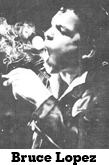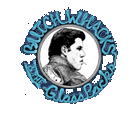|
WITH
SOME 500 PERFORMANCES under our belts, one might
think we're getting just a little carried away with
ourselves. To right the reckless list of the party
barge was the grounding ballast of the noble dissent
-- the newspaper critics whose job it was to blow
the foam off our mugs by praising our comic ingenuity,
stage presence and energy level, but unable to categorize
our post-moderne vaudeville show any other way,
tagged us with the inevitable moniker "Nostalgia
merchants", no matter how fast, how skilled
or how far off the track we drove those chopped,
blocked, re-painted musical vehicles that we had
stolen. Well, it was the was horse we rode in on,
but by now we were as different from Sha Na Na as
Flipper
is from that fish that starred in Jaws.
 Under
constant self-imposed pressure to come up with
original comedy material, the Glass Packs show
in mid-1974 began to resemble the format that
we perform today; more scripted vignettes that
showcased the acting talents of Bob Sarlatte,
the writing and stage direction of Gary Murphy and Larry Strawther, the other
worldly courage of the Mighty Quinn, the singing
and drumming of Mike Moore, the guitar work of
Rob Birsinger and the giant Cajones of bassman
Bruce He's-So-Fine Lopez. While we still continued
to use familiar AM Radio hits as the binding
to this magazine, the featured articles were becoming
more diverse. (E.g. the Mighty Quinn played late
night TV host Sid Hartha, a cigar chomping Hari
Krishna hawking yak hair incense to the tune of
"Boogaloo Down Broadway") Under
constant self-imposed pressure to come up with
original comedy material, the Glass Packs show
in mid-1974 began to resemble the format that
we perform today; more scripted vignettes that
showcased the acting talents of Bob Sarlatte,
the writing and stage direction of Gary Murphy and Larry Strawther, the other
worldly courage of the Mighty Quinn, the singing
and drumming of Mike Moore, the guitar work of
Rob Birsinger and the giant Cajones of bassman
Bruce He's-So-Fine Lopez. While we still continued
to use familiar AM Radio hits as the binding
to this magazine, the featured articles were becoming
more diverse. (E.g. the Mighty Quinn played late
night TV host Sid Hartha, a cigar chomping Hari
Krishna hawking yak hair incense to the tune of
"Boogaloo Down Broadway")
As a result, the coeds-pouring-milk-shake-tins-full-of-beer
parties gave way to a more sophisticated debauchery
- velvet roped, maitre'd tipping, gorgeous hat
check girl swanky night clubs -- and we don't
mean the likes of Sunnyvale's Oddessey Room where
they handed out actual wooden nickels on ladies
night as free drink chits or the Bayside turtle
races at Zack's in Sausalito which we watched
each Tuesday night from the upstairs stage of
the Boathouse next door. (We did play everywhere
with electricity -- including a legendary performance at Mel's Bowl in Redwood City with Carter the Hypnotist).
No, Phase III began in mid-1974 with a one-night stand in Santa Rosa, opening for the Pointer Sisters, quickly followed by a three week gig in downtown Vancouver,
British Columbia at "The Cave" -- an
800 seat paper mache' cavern with a rock formation
balcony above a series of cozy cave-like candle-lit
booths with hanging plaster stalactites -- home away from
Vegas to the Mitzi
Gaynors, Tony Bennetts, Vic Damones
and other late 50's mid-60's top line acts who
worked out their kinks before a crowd of Canadians
before heading Southwest for the Desert Inn.
The Cave was a place not unlike San Francisco's
Bimbo's
365 Club with a perimeter of private
Lincoln booths overhead and the aforementioned stalactites for good measure. .
It was, however, with some apprehension that the
Glass Packs returned to the Cave in 1974 as this
same Cave was the site of our first and only Blimpcrash,
a 1973 opening night debacle of disastrous proportions
that was chronicled in the only vicious review
that we ever endured, one so negative it was positive
like the way heat can be so hot its cold. Don
Stanley, the music critic from the Vancouver Sun,
hated us in the same way the Hatfields hated the
McCoys. If you never been harpooned, it goes something
like this . . .
The 1973 opening night began with a temporary
roadie dropping our tuned guitars on his way downstairs
from our dressing room to set them on the stands
in front of our amps right before we went on stage.
Fearful of the consequences of full disclosure
to the cocky Glass Packs awaiting their usual
warm embrace, Gomo (his real name), the roadie,
said nothing and let us go on stage believing
that our guitars were as we last touched them.
The opening number, "Rama Lama Ding Dong"
began a capella with the sole tonal guidance of
a single note from the only properly tuned instrument
on the stage -- the half-ton grand piano that
Gomo, our soon to be former roadie, couldn't lift
and therefore couldn't drop. We're four bars into
the singing, and so far so good. Then like a thunder
clap our voices were joined by the dissonance
of the dropped out of tune guitars causing the
crowd to dive for cover as the sound of Armageddon
exploded from the stage, a sound more industrial
than musical. By design, our show was on wheels
so there was no stopping the bus, no chance to
adequately re-tune, and the heat of the spotlight
found us squirming for the next hour like the
Beagle Boys dodging in and out of the hot glare
of the prison search light. Busted.
|

